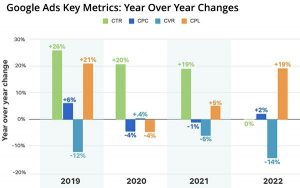
Digital marketing and search engine optimisation has the potential to send a steady stream of relevant traffic to your website and ultimately generate leads and sales.
It really works, if it’s done right.
So if you’re wondering why it’s not and your campaigns are falling short, then it’s likely you’re doing something wrong. What’s also likely is that you’re not the first person to have made that mistake. Here then, are our top five reasons why your digital marketing may be falling short.
1. Getting Traffic But No Conversions
One of the most common problems that businesses face is not converting the leads they get on their websites. So if your traffic is increasing but conversions are suffering, there are several things you should be looking at.
Solutions:
- Know your market — Your buyer persona is the foundation of every marketing campaign. If you don’t know who your customers are, what they want, and what makes them tick, then who’s to say you’re even attracting the right kind of audience?
- Write better copy — If you want to stand out you need to invest in good copywriters and these aren’t cheap. The investment will more than pay for itself though. Copy includes your blog articles, marketing copy across all platforms, landing pages, emails, etc. If these are inconsistent in tone, written poorly and don’t take into consideration your audience’s buyer’s journey, then you won’t get the response you want.
- Make your messaging consistent — If your offering and USP are not clearly defined and explained, it will only end up confusing your leads. Without a clear message across all your marketing channels and campaigns it will appear disjointed and turn leads away from your site.
2. Looking at the Wrong Metrics
KPIs will help you figure out if your campaigns are working, but if you’re tracking the wrong metrics, then you’ll keep sinking money into areas that don’t improve your conversions.
For example, some site owners want more buyers from their email campaigns. Tracking clickthrough rates (CTRs) and resulting sales are a no brainer. However, they often miss looking at other valuable metrics like the trend of open rates over time (emails not read will not get clicks), as well as CTRs of landing pages and opt-in pages.
Solutions:
- Switch your focus from rankings to conversions and goals — While vanity metrics, such as keyword rankings, are useful, you shouldn’t infer conversions based solely on this data. Track more valuable conversions like telephone calls, email link clicks, form completions, downloads, live chat, etc. Measuring these will tell you the top-performing channels, which means you can allocate more budget to them.
- Look at qualitative data as well — Numbers don’t lie, but it also pays to look at qualitative data. Interview your customers or conduct surveys so you can look at other factors like customer satisfaction. Anecdotal data may only give you a snapshot but that snapshot can often reveal exactly where you’re going wrong in a way that numbers can’t.
3. Running Campaigns on The Wrong Channel
This goes back to your buyer persona. If you don’t invest time in conducting in-depth consumer research, whatever clever marketing that you post on social media or online ads will not work.
Solution:
- Understand your audience — There’s no getting away from it: do your customer research. However well you think you know what your customer base looks like, chances are you don’t fully understand them. You need to ask questions like who they are, where do they hang out online, do they respond to ads, or do they prefer to establish trust first via authoritative content? Once you’ve built a strong set of customer personas, you’ll know have a better idea of which platforms you should be investing in.
4. Unrealistic Expectations
Before any campaign starts, you first need to establish realistic expectations (with “realistic” as the operative word here). Lots of business owners make the mistake of working with limited resources (or alternatively, not dedicating enough resources) and then aiming for ambitious goals. This will only set you up for disappointment, stopping campaigns prematurely, or investing in the wrong campaigns.
Solutions:
- Set SMART goals — When in doubt, go SMART: Specific, Measurable, Achievable, Relevant and Timely. These are goals that can be achieved in a cost-effective manner (e.g. rank on the first page of Google SERPs within 1 year, have 100 newsletter subscribers in 3 months).
- Be patient — There are digital campaigns that take time to produce results. SEO and content marketing, for instance, often take months before you start to see the needle move. Social media marketing, even more so. This is a long game so be realistic about how long it’s going to be before you start to see ROI.
5. Tough SEO Competition
SEO can get technical and daunting, especially if you’re in a highly competitive space. If you’re finding it hard to rank, there are several things that might help.
Solutions:
- Differentiate yourself — Check out your competitors and see what they are doing. Then, try a different strategy or fill in a gap. For instance, you can add videos on top of articles to also rank on YouTube (the second largest search engine). You can also write about topics that your competitors haven’t written about yet.
- Stay updated — Algorithms change on a regular basis. Make sure you keep an eye on new updates and what the SEO industry is saying so you can adapt and adjust your strategy accordingly.
- Optimise your site properly — How confident are you with your on-page SEO and off-page SEO? The simple reason you might not be ranking above your competition is that your site is poorly optimised. You might want to think about conducting an SEO audit to see what you need to improve. Of course SEO isn’t a simple discipline to get your head around and can be very technical and nuanced. Working with a trusted SEO agency allows you to bypass this steep learning curve and take this off your plate.
Digital & Social Articles on Business 2 Community
(70)






